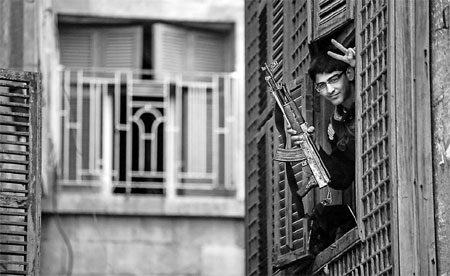Assad: 'I will live and die in Syria'
|
A Syrian university student-turned-rebel makes a victory sign from his post in an ancient building in northern Syria on Thursday. A defiant President Bashar al-Assad has rejected calls he seek a safe exit, vowing he would "live and die in Syria" as fighting raged in the country. John Cantlie / Agence France-Presse |
Embattled president gives interview to Russian media
Syrian President Bashar al-Assad said he would "live and die" in Syria and warned that any Western invasion to topple him would have catastrophic consequences for the Middle East and beyond.
Assad told state-run Russia Today that whether the president can "stay or leave" is a "popular issue" and "the only way (it) can be done (is) through the ballot boxes".
"It is not about what we hear. It is about what we can get through that box and that box will tell any president to stay or leave very simply," said the president, speaking in English.
"I am not a puppet, I was not made by the West for me to go to the West or any other country," Assad said. "I am Syrian, I am made in Syria, and I will live and die in Syria."
The Syrian leader, battling a 19-month uprising against his rule, appeared to reject an idea floated by British Prime Minister David Cameron on Tuesday that a safe exit and foreign exile for the London-educated Assad could end the civil war.
Assad also denied Syria was in a state of "civil war" but said the conflict with rebels could be "a long-term war" if they continued to receive support from abroad.
Assad described as "unprecedented" the support which he said the rebels were receiving from abroad in terms of arms, money and political backing.
If the support for rebels from abroad stopped, he said, "I can tell that in weeks we can finish everything".
"But as long as you have a continuous supply in terrorists, armaments, logistics and everything else, it is going to be a long-term war."
But Assad denied that the country was in civil war as such conflicts should be "based on ethnic problems or sectarian problems".
As the two sides battle for the upper hand, civilians are bearing the brunt of the crisis.
Peter Maurer, the head of the Geneva-based International Committee of the Red Cross, said the civil war has been in a downward spiral for months.
"We can't cope with the worsening of the situation," Maurer said. "The seriousness of the crisis is deepening with every day and this trend has been uninterrupted since summer."
The Red Cross has improved its transportation and logistics, making it easier to bring in truckloads of food and medicine, but it has become overwhelmed by the dire need of hundreds of thousands of people struggling inside Syria, he said.
Panos Moumtzis, the UN refugee agency's coordinator for the region, said on Friday that 11,000 Syrians have fled the country in the past 24 hours in what they call an unusual spike in the number of refugees.
AFP-AP



















